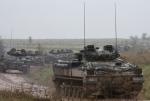An article from the Journal Strategic Studies, which should be of interest for Afghan campaign veterans and watchers - full edition available on-line - and the actual title is 'Bureaucracy Does Its Thing: US Performance and the Institutional Dimension of Strategy in Afghanistan':http://www.tandfonline.com/doi/full/...Bjarb0.twitter
The author is a retired DoS Pol-Mil Officer:It is not too soon to draw cautionary lessons from the inconclusive results of US performance during more than 11 years of Operation ‘Enduring Freedom’ in Afghanistan. As in Vietnam, fundamental difficulties persist in adapting enduring institutions to the requirements of strategy. At the heart of the matter is tension between the assumptions that underlie counter-insurgency as practiced in Afghanistan and organization of the US Armed Forces, State Department, and Agency for International Development. Knowledge of basic principles and necessary changes is available to answer the question, could the US have done better?Todd Greentree is a member of the Changing Character of War Programme at Oxford University. A former US Foreign Service Officer, his political-military experience in five conflicts began in El Salvador during the early 1980’s. Most recently, he served as Director of the Initiatives Group in Regional Command-South, Kandahar, Afghanistan during 2010-11.











Bookmarks